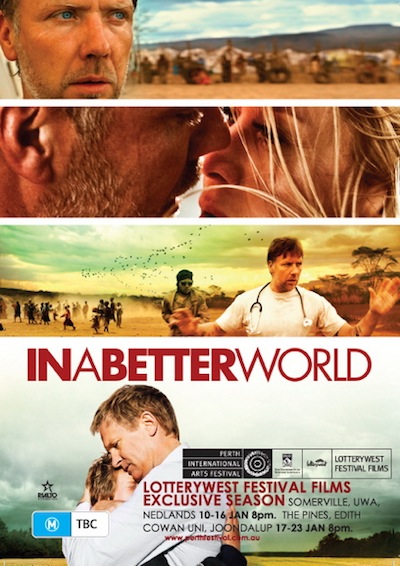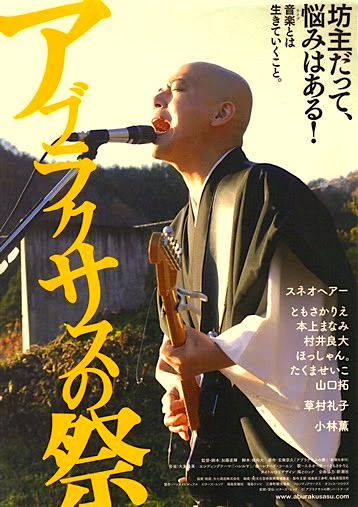By Joe Bendel. For one young boy, it’s tough being the Swedish kid in his Danish school. While his father is an advocate of turning the other cheek, his new friend is a proponent of more direct action. As a global meditation on bullying, Susanne Bier’s In a Better World (trailer above) should probably be considered a leading contender amongst the nine shortlisted films for the best foreign language Oscar. Its chances will probably be further bolstered when it screens this week during the 2011 Sundance Film Festival now underway in Park City, Utah.
Swedish plus conspicuous retainer equals frequent poundings for Elias, a good kid struggling with his parents’ separation. He idolizes his father Anton, an altruistic doctor often absent volunteering his services at a free African medical clinic. One fateful day, the new kid Christian intervenes in a bullying session, walloping his tormentor with a bicycle pump before pulling a knife on the larger boy. Problem solved.
 Christian has a few issues himself, including a deep-seated resentment of his father following his mother’s untimely death from cancer. Though their fast friendship should represent healthy socialization for Elias, Christian proves to be a nakedly manipulative little wretch. Better is also not exactly subtly hinting at his self-destructive impulses, portraying him like Poe’s Imp of Perverse, constantly haunting the roof of a hulking old factory while brooding darkly. Yet, it will be Anton’s conflict-avoidance strategy when encountering a grown-up bully in front of the boys that serves as a catalyst for Christian’s potentially tragic plans.
Christian has a few issues himself, including a deep-seated resentment of his father following his mother’s untimely death from cancer. Though their fast friendship should represent healthy socialization for Elias, Christian proves to be a nakedly manipulative little wretch. Better is also not exactly subtly hinting at his self-destructive impulses, portraying him like Poe’s Imp of Perverse, constantly haunting the roof of a hulking old factory while brooding darkly. Yet, it will be Anton’s conflict-avoidance strategy when encountering a grown-up bully in front of the boys that serves as a catalyst for Christian’s potentially tragic plans.
Better is sort of like a Nordic Crash, with the teachable moments coming at a regular clip. Unfortunately, the film often confuses earnestness with profundity, offering plenty of the former, but not nearly as much of the latter. In fact, it seems like Bier somewhat loses control of her message. Comparing the brutality Anton witnesses in Africa with Christian’s escalating anti-social behavior, she clearly implies the tendency towards the animalistic is present in all of us, even ostensibly civilized Scandinavians. Yet, one could easily conclude within the context of the film that a little fight out of Anton might have been more productive, preventing considerable tragedy in both settings.
Though laboring under Better’s self-conscious serious-mindedness, much of the ensemble distinguish themselves rather well. As problematic as his character seems in retrospect, Mikael Persbrandt brings a compelling dignity to Anton, largely selling his Gandhi routine in-the-moment. After accepting too many villainous roles in English speaking productions, Ulrich Thomsen redeems himself with a deeply humane supporting turn as Christian’s grieving father Claus. Amongst the young actors, William Jøhnk Nielsen’s work is particularly notable, projecting the full range of emotions roiling within the understandably pained Christian.
Even if Better’s “so there” takeaway really is not there, it is the kind of prestige picture that perfectly suits the Academy’s sensibilities. Indeed, cinematographer Morten Søborg captures the harsh beauty of the African landscape, bringing to mind many past Oscar favorites. Clearly tremendous passion went into Better, but it falls short of its ambitions. While not an out-and-out failure, it should not be a priority for those making the Sundance scene when it screens again on Wednesday (1/26), Saturday (1/29) and Sunday (1/30).
Posted on January 23rd, 2011 at 10:02pm.

